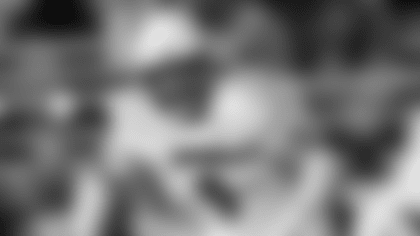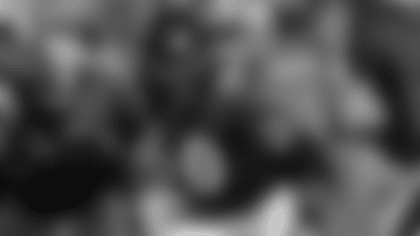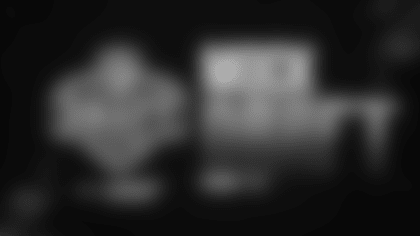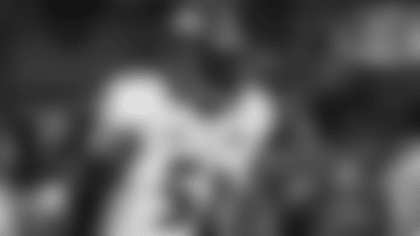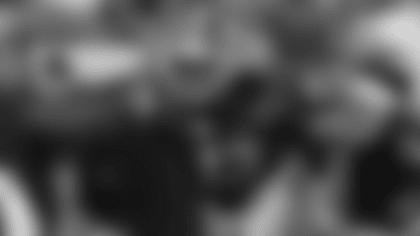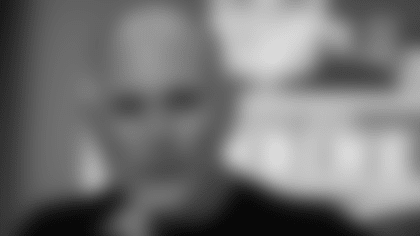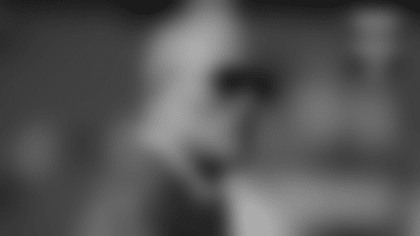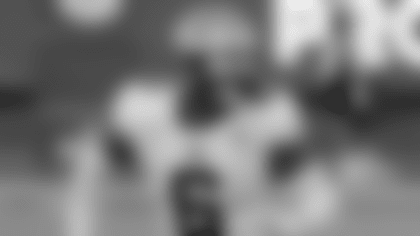General manager/executive vice president Ozzie Newsome's opening statement regarding CB Samari Rolle:
"Before we get started with the Draft, John [Harbaugh] and I will make a couple remarks about Samari [Rolle]. I spoke with Samari Rolle a week, maybe 10 days ago, and had a conversation with him and told him that we were going to be terminating his contract. I had a short conversation with him, he had a couple of questions for us, and he asked me to contact his agent. And I did, as well as Pat [Moriarty], and we talked to a couple of things. But, today as of the 4:00 p.m. wire, Samari is going to be terminated. And I'd like to say this, and I waited until this time, because I think he was due these remarks from me to you all personally: There aren't a whole lot of times that you get a chance to watch a guy play in college and then you compete against a guy because he's in the same division, or you get a chance to play – and I'm looking at Qadry [Ismail, because] he's one of those guys that I've had a chance to do that with – but then they come and get a chance to be a part of your football team. And Samari was one of those guys that, you know, we saw coming out of Florida State, we saw the ability that he had. He goes into the second round with the Titans, and we all know the balance that we had with those guys. And then because of what transpired in Tennessee, we were able to sign Samari to a contract here, and we got a chance to appreciate his talent and his abilities as a football player, but also as a person, of who he was, he and [his wife] Danisha and how they became great Ravens. I'm just glad to be able to say, 'Hey, I've had that opportunity to know Samari.' We know the big incidents and what happened towards the end of his career [with injuries] that maybe shortened it. I don't know where he's at with that, but I just wanted to say that. John?"
Head coach John Harbaugh on CB Samari Rolle:
"I guess I had a chance to get to know [Rolle] through some of those end-of-career [injury] issues that he had here mostly last year and then into this year. But just the way he carried himself and the way he handled adversity, the way he fought through the medical issues, the injuries, the way he played at the end of the season and the playoff run when he came back and just played great for us through all that stuff – I think that speaks to him. And then also just the stuff, as we transition programs, his support, but also his frank honesty in terms of what he saw, and what he felt we needed to do, and where we needed to go, and how we needed to do it. He never shied about letting you know that. So, [he is] just a true class individual, and it was an honor to work with him for two years."
Newsome's opening statement regarding the Draft:
"I always have to think about how I can begin [this], and Jerry Coleman [of Fox 1370] gave me one statement, and since I used that last year I won't [use it this year]. I said I was not going to try to be cute today, so anyway. I was trying to think, and I know Kevin [Byrne] and some of the people in [public relations staff] probably can give me the number, but hopefully [I'm accurate in that] we've picked more in the 20's than we have in the top 10 since I've been here. And the one thing that I've learned – even from that very first draft that I was a part of here in Baltimore – is when you're picking in the 20's, the Draft really does not unfold for you until you get past 15 picks. We can sit there, and we're just like you guys and young ladies, in that the first 15 picks we're just sitting there and we're taking a guess as to who's going to pick who and who's going where for that first two hours or however long it takes for those first 15 picks to come off the board. But after that first 15 picks, then the Draft starts to crystallize itself for us and we can start to go into targeting players that we think will have the opportunity to make it or not. That's where we are with this Draft. The new format – I was talking with some people at the League office, and we're all trying to figure out what are we going to do all day Thursday knowing that the Draft doesn't start, actually [until] 7:30 p.m. before St. Louis goes on the clock? So, that'll be different in itself. It'll be different in that you've got all day Thursday, then you turn around and have all day Friday for rounds two and three, and then on Saturday it'll be back to the way we are accustomed. But, you know, this league, we can adjust to a lot of things. We're very good at dealing with change, and we'll deal with the change that the Commissioner has decided to do with this Draft in making it a three-day event. And hopefully, it will have the popularity that it has had over the last three or four years, going on primetime. With that being said, Coach, you want to say anything? No? Eric [DeCosta], Joe [Hortiz]? OK, good we can open up for questioning."
Do you ever take a look at the upcoming schedule and factor those teams into the selections that will be made in your Draft?
*(NEWSOME) *"You know what? I do take the opportunity to… At the end of the Draft, we list the picks by team. So, I like to go and look to see what Cleveland has done, what Cincinnati has done and what Pittsburgh has done first and foremost, because those are division rivals. And we know those players for the most part, and then you can come away and say, 'You know what? Pittsburgh did a real good job.' I mean, Cincinnati has done a great job the last two or three years in the picks that Marvin [Lewis] and the [Bengals] have made there. So, you go with that, and then you check and you just look across the board – at least I do – and say, 'Well, what if some other teams had picked some players that we really liked?' And you go from that. But as far as [being] competitive and preparing the team, I guess John would have to speak more to that."
*(HARBAUGH) *"Well, yeah, I think definitely you see, you look at the Draft and you say, 'OK, how do they stack up now, and what are their weapons, and how did it change them as a football team?' I think we look, going into the Draft, what their needs are and try to predict who [will be picked]. We're interested in who Pittsburgh's going to maybe take and who Cincinnati is going to maybe take. That's all part of the process. But to me, the Draft is about – and Ozzie kind of talks about this all the time – it's about best available player and at the same time about building your football team. So we're interested in the guys – the best available player for the Ravens – that fit our team and makes us the best possible team we can be, because in the end we're building a football team. So, we'll go through the exercise of setting the whole Draft up and laying it all out and stacking guys and ranking guys and determining who we think is going to go where. But, in the end, who are the guys that we have a chance to get in these different spots as we come up to pick that are going to make our team the best team possible it can possibly be and fit what we're looking for? Our kind of guys. And I think the Ravens have done a great job of that just for years and years."
How is the depth of this Draft compared to previous years and how important is it to acquire more than just the five available picks this year?
*(NEWSOME) *"Well, I guess the best way to describe Drafts is… I think with the number of juniors that came out this year that this Draft is probably… It's hard to say whether it's better than the year before, because it's hard to determine two or three years from now how good some of the players are going to be. But, I think the juniors have impacted this Draft more so than any other year, and I think that's what the difference is. And as far as acquiring picks, you know, No. 1, we have to be prepared to pick at 25, and we're very close to getting ourselves in that position. We've got another set of meetings next week, but the only way you're able to trade back is you've got to have a trading partner. And if the phone doesn't ring, then you have to pick. And if it does ring, then you have to weigh the player that could be there versus moving back and taking the additional picks."
What do you think of this year's class of tight ends?
*(NEWSOME) *"Again, you know, if you look at it today, you could say it's a good class. But up until they get on the field and play, it'll take us two to three years to make that determination. But when you look at it, I could probably say this: There is probably a tight end that we probably could take in every round in this Draft, and we would probably feel good about it."
When a guy misses a lot of a season before he enters the Draft, such as Dez Bryant, how does that affect the evaluation process on that player?
*(DeCOSTA) *"Well, I think Dez is a guy with… He's got a great body of work. His junior year, his sophomore year, we saw him play at length. [He had] a lot of production, tremendous season. This year, first three games, fortunately we had a chance to see him work out, we had the chance to talk to him, a lot of different resources and ways to skin a cat to kind of fit a guy's profile in. And he's caught a lot of balls; we have all that on tape. He did play a little bit this year. We've talked to people at the school. You do all your research and you just kind of build a profile and see where he stacks against everybody else. But it is a little bit more challenging, but fortunately we have a lot of tape to look at."
Ozzie, do you feel like you've addressed the wide receiver position, or does it still need to be looked at during the Draft?
*(NEWSOME) *"Well, that goes back to best player available. If the best player available for us at 25 is a wide receiver, then we will take that best player. But, you know what? What you also have to look at – not only this year but you have to look at next year and two years from now – what your team will look like at each position. And that's what we try to do. That's what John and I spend a lot of time doing when we're talking about 'building a team.' Not only just trying to build it for September, for the opener, but we're also trying to build it for the future. So, wide receiver still is an important position for us as we head into this Draft when you look at our roster and what potentially could happen to it over the next two or three years."
Why is it so difficult for teams to draft wide receivers, and does your background as a receiver help you in any way to see things differently from prospects?
*(NEWSOME) *"Maybe to answer the second part, no, I don't know if my background [helps]. My background may hurt me more so than help me, because I might be looking for myself, and myself is not in the Draft. But I think with people, other than maybe the quarterback position… You know receivers, when they come in the Draft, the things that they have to adjust to [are difficult]. They have to adjust to coverages, they have to adjust to splits, they have to understand 'hots,' inside adjust, they have to understand depth. It's a lot of things that go on with a receiver before the ball is even snapped. And then once the ball is snapped, there are probably another five or 10 things that go on with that guy, and then the next thing you know, you have to catch the football. So, it makes for a difficult transition, and not a lot of receivers have the opportunity to play in complicated systems like we have in the National Football League. The other thing that makes this tough is grading a receiver in college, and just grading production can be a misnomer because a guy… I think there's a guy that caught over 100 passes this year in this Draft. That doesn't necessarily mean that he's going to be a good player on our level. So, I think a lot of things just go into it. You can just turn around and hand the ball off to a running back, and his instincts from youth league [and] up are just going to take effect. But with a receiver, it takes a little bit more than that. And like I said, other than playing quarterback, it's tough. You've got a corner, you can just go out there and tell him to cover that cat and he probably can do it. But, it's a little different at receiver."
What do you think about this year's cornerback class and do you think a lot of them will be selected in the first round?
*(DeCOSTA) *"Well, I think you know there probably are four or five guys that definitely merit a first-round grade. You know, you've got Joe Haden, [Devin] McCourty. Kyle Wilson is a good player. Kareem Jackson is a good player. Chris Cook is a good player. You know, they're all first-round, second-round-type guys, and probably all 32 teams have a different ranking. But, they're all good players, they've all tested well, they're all good kids, and all will be good players in the league."
Which injured players might be on your radar that you didn't have a chance to see because of their injury, and what extra work goes into doing your due diligence on those prospects?
*(HORTIZ) *"You know, I'll tell you, the guys that were hurt – particularly their senior season and not able to work out at this point – I think you have to rely heavily on the film from their junior year. We do a good job – our training staff, medical doctors – getting the rundown, grading them, putting a medical grade on them, finding out where we think they'll be [and] where they are currently. You'll have some guys be able to go through a limited workout, and you try to get your eyes on that to see what they look like there and understanding that they're going through it at a maybe less than 100-percent ability level. But I think the main thing you do is you look at what they've done when they were healthy as a junior or maybe their first six games before they were injured this year. And [you have to] just trust your doctors and trust the opinions you see on the guy as a player."
John, what do you think about talented players that have maybe shown a lack of motivation? Do coaches want the chance to motivate that player, or are you weary of that attitude?
*(HARBAUGH) *"I'd say it's probably 'yes' to both of those things. Every coach thinks they can get through to any player. When you take a chance on a guy, then you feel like you're going to be able to make the difference, and a lot of times it depends on where he's coming from. When you say 'lack of motivation' in terms of, is it football? Is it school? Is it personal life stuff? You know, what is it that's been his issue and can we overcome that and turn him into the kind of player and teammate we want? The other side of it is, sometimes it's just a matter of, 'No, there are a lot of options, there are a lot of good players up there with this pick, and let's take the guy with the minimal downside.' So, it's case-by-case, but yeah, we think both ways. We want a shot, but we also want the best possible chance for a guy being successful, too."
What do you think of this year's crop of defensive ends and does it seem like a bunch of them have first-round grades?
*(DeCOSTA) *"Well, there are a lot of good defensive ends/outside linebackers in this year's Draft. I think [Sergio] Kindle is a good player. I think [Jason] Pierre-Paul is a nice player. [Derrick] Morgan from Georgia Tech – those guys are all excellent pass rush guys. Some guys are bigger, maybe more 4-3 defensive end types. Other guys maybe translate best as a 3-4 outside linebacker. Some guys can play both. But this year's Draft, there are some good players that can rush the pass. There are some guys that can drop and have that flexibility to be hybrid-type guys for you as well. It'll be interesting to see how they come off the board."
What is your impression of some of the big guys, like DTs Terrence Cody and Dan Williams?
(DeCOSTA) "Well, we love those guys. Traditionally, we always had a lot of success with those big run-stuffing guys. I think Dan Williams is a really good player. [It's] very unlikely that he will be there when we pick at 25; I think he will come off the board very quickly. He can two-gap and rush the passer a little bit – deceptive athlete. I think Cody's just a guy you can't move. He's a 350-pound guy, very strong at the point of attack, a deceptive athlete [with] very good feet in a short area. With all the 3-4 teams in the NFL now, I think both those guys are going to be very hot commodities."
What is the possibility of gaining picks via trades and have you received any calls about teams being interested in T Jared Gaither?
(NEWSOME) "I will answer the second part: No, I have not had any dialogue with any ball clubs about Jared. The other aspect of it – what John, Eric, Joe, and I, along with Steve [Bisciotti] and Dick [Cass] – when it comes to making trades of our players, then we put a value on what we think that player is worth. The same thing that Arizona did with Anquan [Boldin], they put a value on what they thought he was worth, and we were the team that met that value. So, that is what we would do if it came to that. I guess there are sources in this building – I never know who they are – but I have yet to field any calls from any team about any of our players this offseason. The way John and I go about building this team, we look at it and say, 'These are our players, and up until someone comes and offers something that is really, really enticing, then these are our players and these are the ones that they are preparing to get ready to play in September.'"
Do you think because of the new draft format that there will be more trades in this year's Draft?
(NEWSOME) "In that there is more time, yeah. I mean, why not pick up the phone and call somebody and ask them [if they] are they willing to part with picks or part with players? The one thing that Eric and Pat [Moriarty] do a really good job of is knowing what teams have a lot of picks in what rounds. So, why not pick up the phone and call those teams to see if they are willing to trade some of those? But, I guess with all the time that we will have going from Day One, to Day Two, to Day Three, it will allow for some phone calls to be made. But I think in the end, people are just going to pick players. Sometimes too much time can be a detriment to you, too. [You think], 'Why would I want to get rid of this player?' So you have more time to think about it, so it could also work against you having too much time."
How difficult is it to evaluate the value of a player that another team shows interest in? Is there a book you use?
(NEWSOME) "No, it's no book. But again, it's just like any of the preparation that we try to do. When we sat down with Steve [Bisciotti] going all the way back to the end of the season, we start to talk about things like that. So, when we get involved in a phone call about a player or when we get involved on calling a team like we did on Steve McNair and Fabian Washington – that we got in the draft – then we've had some dialogue amongst ourselves as to what potentially could happen. So, when that situation comes up we are already maybe at second base. So, to get to third and the fourth base is a little bit easier than starting at the home plate."
How much does the uncapped year affect the ability to make trades in the draft?
(NEWSOME) "Well, no question. The salary cap quote is not in play this year, but we still are trying to operate under some sense of a cap. You just cannot dismiss that. But, to answer your question, would I have to create space to bring in someone with a $10 million salary cap this year? No, I would not have to do that because there is no salary cap."
Does that make it a lot different psychologically for what you could do?
(NEWSOME) "No, I think still the merits are still there, because in talking with Dick [Cass], Steve [Bisciotti], and John, still it's, 'What is the value of that player and what are we giving up?' You are not dealing cap space, but you are still dealing with picks and players. And we value both."
When it comes to a player like Dez Bryant, there is a perception that his stock is falling. Is he someone that you just need to get a lot of information about to know really what you are getting if your select him?
(NEWSOME) "I think Eric basically answered that a little bit. You know, we have a profile. Steve [Bisciotti] has made the statement in the end-of-the-season press conference that we are willing to take risks on players. To a lot of people in the League, taking Michael Oher was a risk last year. So, we are not averse to taking risks, but we do our homework. We have very good scouts, and one of the best things they do is get us information. And when we get the information, I think we do a good job deciding what information that we need and what we can just kick out."
Coach, this is your third draft as a Raven. Have you noticed if the coaching and personnel staffs have come together to find guys that "play like a Raven?"
(HARBAUGH) "We talk about this. I have talked to Ozzie about this as well. Ozzie sets up an environment where it is very democratic. It's very inclusive, and he and Eric and Joe, they seek out information so the coaches are very involved. The coaches are working hard. Then we get into those draft meetings and we have conversations, and they basically encourage everyone to get on the table and fight for your guys. So, it is just a great process; it's a lot of fun. What I have noticed is every year it has gotten better. We have all come closer and closer in terms of not just understanding the coaches' vision for the team, but I think we are building together our vision of the team and what we are trying to build here. And in the process, we learn about each other. We learn about our players. We are talking the same language more now than we ever have before, and I think that just gets better every year. But that's exciting. We sit in there and we are all talking the same language. [If] we kind of have the same understanding of players, then I think we have a great chance of being successful."
How much stock do you put into the individual meetings you have with a prospect?
*(HARBAUGH) *"Basically, the facts are what you have read or heard about the guy, but someone else's opinion is not valid. I value what our people think, what our scouts go out and find about a guy, and then we kind of apply that information to the conversation. And then you just want to get a feel about what kind of guy the guy is. You talk about character and the issues he has had on the field [and] off the field. Really, what we are finding out is what kind of guy is this. Does he have a good heart? Is he a Raven, so to speak? Is he going to help our team get better? What kind of guy is this? We all kind of do that together. Like Michael Oher, we felt like he was our kind of person, and I think that has proven to be true. I don't think in the last two years we have made too many mistakes in bringing those kinds of people in here. And to me, that's what Ozzie's process really is effective in figuring out."
Do you foresee any situation where you could trade up in this year's Draft?
(NEWSOME) "Yeah, I mean we had six picks last year and we traded up and got Michael [Oher]. There are a lot of ways you can build your football team, and if we feel like someone starts to come down the board and he can impact our football team, impact it in a way that we can afford to do some other things on our roster, then yeah, we will move up and get that guy.Stan [White, WBAL] can probably remember when I was doing the interview with him during the Draft last year, and I told him that the chances of us moving up were not very good. And what did I do? I moved up. So, you just never know. You just have to be prepared to go either way."
Can you tell us a little bit about the process of resetting the Draft board between days?
(DeCOSTA) "Well, the first thing we do is eliminate the names. Then we meet with the scouts and coaches. Ozzie and I have a feel for who the scouts and coaches really like at that point, [but] we do take need into the equation. For instance, the year we drafted Joe Flacco, we weren't going to then draft Chad Henne in the second round. He is not an option at that point for us. So, we do look at it that way, we do make some changes, we look at what we have done, [and] we look at what we want to accomplish based on the roster. But the biggest thing we do is really try to find the players that we really like, that the scouts really like, that the coaches really like – the traits that we are looking for. Ozzie and I will meet and talk about certain guys. In the past, we have looked at some guys on tape, actually that night or possibly that morning, come in and spin through a couple of games if we have a couple of guys really close in a debate – maybe two players at the same position. We will then go back and reevaluate both players to see which one we like [the best]. We will take into account special teams, other factors, and then find out how many of those guys we can get. In some years we have been very successful, and then other years we've had four or five guys – particularly in the old fourth-round format when you would come in the beginning of the fourth round and we may have five or six names hoping to get one of those five or six – and they may all get picked right before you pick. And then you are forced to scramble a little bit and get a good player."
So what will you do with that extra time even going into the third day?
(DeCOSTA) "I think what we will try to do is probably try and watch a little more tape on some guys if we have some clusters that we are trying to split up. I could see a scenario where the phone will be ringing a little bit, and you may have Vince [Newsome], as the pro personnel director, maybe looking at a couple of pro guys possibly, and we may be looking at some college guys. The guys will probably be working a little later at night to get things sorted out. In general, once we finish up the meetings next week, everything is going to be pretty much set, and in actuality, we really don't do that much tweaking once the Draft starts."
The year after you drafted CB Gary Baxter, you said that you liked to watch how players react when they lose, to see how they play at the end of games. Do you still do that?
(NEWSOME) "Well, you know we have always valued game tape, and with means like that I hear coaches talk a lot about what happens when the play is away from a guy. When you watch a player in a full game, a lot can be told about that player. Whether it's a game where he is 30 points up or 30 points down, there are some things that you can see, how a player is still competing or not. And that is all part of the puzzle that we look at. It is not an end all, but it is part of it."
How are teams going to look at Maryland tackle Bruce Campbell and Anthony Davis from Rutgers?
(DeCOSTA) "Well, they are both very good players, juniors, so you would like to think they have a lot of developmental upside to get a lot better. Both guys are gifted athletes. Campbell has freakish size, tremendous wingspan, very gifted foot athlete, very strong guy who has all the tools to be an elite tackle in the league. I think Davis is a guy with heavy hands, good feet, and not quite as big, but very physical. Both guys are works in progress – as juniors typically are – but both guys have unlimited amounts of potential, and I would suspect that they both come off the board pretty quickly. If not through the first 25 picks, definitely by pick 40."
How high could you see Campbell and Davis being taken in the Draft?
*(DeCOSTA) *"I mean, I think definitely first round. If not first round, midway through the second round."
Does Demaryius Thomas' broken foot hurt his stock?
*(HORTIZ) *"You know, with a broken foot, that kind of falls back in line with the injuries. Guys hurt this time of year, [who are] not working out, it's just seeing how it's healing when he goes to the Combine and doctors get a look at him. You know, when he goes to work out, how is he doing in the workout? In terms of the run-oriented offense, you don't see the true route tree with him, a full route tree, and so you're trying to project in that regard. He did play some… He's familiar with the more pass-oriented offense from his redshirt year and his redshirt freshman year, but obviously, his last two years were in the triple option. So, it effects your projection to a degree. What you look for when you look at these guys is the traits to do it – the quickness, the ability to drop his weight, whether he can do that. And if teams feel comfortable with it, then they're going to have the higher value on him. If not, then they'll drop him down."
Joe, can you talk about the depth of this year's interior defensive line class?
*(HORTIZ) *"There's a good mix, really, this year. Eric talked about the big boys. They can eat up the blocks. But then you have the Brian Price's, the Geno Atkins', those quick-footed guys that can penetrate and disrupt. And there is a good blend of both groups throughout the Draft. And the teams that covet those up-field-attack and defensive tackles, they're going to be there for them to take. And then in the same regards, the 3-4 teams, they're going to be able to find their big-body guy. So, I'd say there is a good bit of depth in that regard when you blend the two together."
Can you describe what it's like when a team takes a player you wanted right before you pick? Also, how much do you take into considering the needs of the teams picking around you?
*(DeCOSTA) *"I think, first of all, we prepare for every single possibility. I'm a pessimist. I typically think the guy we want is going to get picked anyways. It's more frustrating than really a scramble. We've had many years where the guy's gotten picked that we wanted, and you just go to the next guy on your list. Once you do that ranking, you can sleep at night because you have the players ranked. You can just go off the script. We have as many possibilities and scenarios as you can ever imagine. We've gotten upset at times. I can think of at least two or three times in particular when we were going to draft a guy. I'll tell you an interesting story, just a quick one: We weren't planning on drafting Ed Reed. We were going to draft somebody else, and he got picked. And it was a player that we had ranked higher than Ed, quite honestly. Ed was our 24th player, I think. We drafted 24th that year, and we got the best player in the Draft. So, there is an element of luck to this thing. Sometimes you need to get lucky."
How do you balance the player's work on the field vs. how he works out at the Combine?
(HORTIZ) "I think the film is the most important thing on a player. The 'workout warriors,' they kind of alert you. By the same token, the people who fail miserably at the workout alert you as well. You'll find good football players that just don't test well, and we go over them the last round of meetings. We'll go over them in the early round of meetings. They're just not physically as gifted as maybe the guys that come out and test well. In the end, we always, in my opinion, have liked the guys that play football well on film. You acknowledge a guy who's worked out well, and maybe you do a little extra work, take another look at him, find some other games. As an area scout, you go in there and look at the first three games, four games of the season, and maybe you didn't see all these things. And hey, 'He worked out well; I'm going to take a look at games seven, eight and nine instead.' It kind of gets you to take a second look at some guys, but ultimately, you have to see a football player on film – not in shorts and an Under Armor T-shirt."
Does the prevalence of spread offenses in college change the way you evaluate cornerbacks?
(NEWSOME) "I think we still use the same criteria for evaluating a corner regardless of the offense he's playing against. It's more or less the receiver that he's playing against that we make the evaluation against. The spread offense has hurt some other positions in terms of evaluating, but not corner."
Since the season ended, can you talk about the rise or fall of Tim Tebow – just your own assessment of him and what he's done since the Combine to better himself or decline?
*(HORTIZ) *"Tim, it seems like he's had a rise and a fall since last year, really, up and down. Last year there was a lot of buzz on him, and this year the microscope gets put on him… You find all the flaws. I know Ozzie has mentioned it before to us and probably in here – the guy comes back for his senior year and everybody picks him apart. Tim's a winner and a great college football player, and he does need developing as a pro, as a passer. He does need to clean up his mechanics. I think those were picked apart through the fall and even to a degree at the Senior Bowl, his struggles there. Well, he's not familiar with a pro offense. He never has played in one, so that is going to take time. What he's shown since the Senior Bowl is his dedication and passion to work and improve at it. They tell you when you go in there he will not fail. He'll will himself into being a good quarterback, and he's such a fine competitor and a great person, leader – his intangibles are off the charts – that it's hard to bet against him. I think through his workouts and his interviews and people looking at him now, that's why you see him kind of bumping back up after taking that swoon, the January swoon after he got to the All-Star games. He's got some work to do, there's no doubt. But, he does have a strong arm, and he is an intelligent player, and he's as tough as they come."
Are you going to enter this Draft without knowing Ed Reed's future? Are you comfortable that he will be coming back?
*(NEWSOME) *"The way I look at it is up until they send a letter in to the League saying they're retiring, then they're a Raven. Up until I get the information from the League that they've sent that letter, then right now I expect him, and so does John and so does Steve [Bisciotti], to play in that very first game. If he sends that letter in, then that's a different story."
Have you talked to Reed?
*(NEWSOME) *"I have not, but there are people in this building that have had communication with Ed Reed."
Don Banks from *Sports Illustrated *reported, having talked to a number of personnel people, that there was a higher than usual amount of players who admitted to using marijuana at the Combine. How does that particular aspect of a player's background affect your evaluation of him?
*(NEWSOME) *"When we get the opportunity so sit with the players – we get an opportunity to interview 60 players in our room – and because of the background that our scouts get, we have a lot of information on those players. But now players are forthcoming with that information, because it's better to come clean than to have us find out something about them, and then we have to go back to them. It's a case-by-case situation with us, when we talk with a player that decides to divulge… I mean, there are a lot of things that get divulged in those 15-minute sessions. What we have to do as a staff is to take it all in, evaluate it, and then see, 'What is that player going to be like once we get him into Baltimore?' The other thing that we feel good about is once we get the players here with Harry [Swayne] and O.J. [Brigance] and the way the coaches and the way John runs his program, is that we've got a chance to affect them a little bit – to help them be our kind of player. So, it's a lot of information that comes out in those meetings, and I think it's a credit to the players that they take the opportunity to be honest. We like honest people, and they're coming clean."
*(DeCOSTA) *"I think the biggest thing, we probably have seen an increase over the last 15 years in marijuana use, and we've been forced to adjust as well. There's no set formula that you use to make decisions on these guys. Ozzie talked about it – it's case by case. We consider every single player differently – all the circumstances. Have they been forthcoming? Any issues – when did these issues happen? Are they habitual or a one-time thing? What do other people say about these guys? All the information we can generate we look at and scrutinize and make decisions. The marijuana use seems to have increased, which is a concern, but I think we've got a great structure here in place, and our scouts and coaches do a great job of getting information. We know exactly what we're getting into when we select a player, and I think we have a plan in place for every player that's different. We treat each player differently in some instances. I think players can come here with background issues and end up thriving."
Ozzie, having been in the League as long as you have, is it safe to say that as much as you can find that out, there could still be that culture with guys who are playing in the League? Are you aware of that still being a part of the professional sports culture?
(NEWSOME) *"The one thing I do know is that our players get tested at least once a year. And steroids, another thing, is random. I don't know. I'm 54 years old, so for me to understand what 20-year-olds are doing right now is a little different. Maybe you guys can figure it out, but I'm missing the boat. I can't even understand the music they're listening to. (laughter*) I don't know, you know? I trust the fact that every team has one person that's responsible for getting that information about drug use, and I don't know how the Ravens stack up with 31 other teams, but I know that I feel good about the way our locker room is. If there is some underlying thing, underlying situation that you're talking about – I'm not aware of [it]. I don't keep my head in the sand, because as you all know, I'm not a road scout. I'm here every day, and I think I have a good enough relationship with the players that they could share some things with me, because I just don't hold it against them."
Ozzie, everyone knows that you make the final call for the Draft picks, but can you talk about Eric's input and strength in evaluating players?
*(NEWSOME) *"I think, No. 1, Eric's real strength is that he came through the program, and the program is successful – the way we start it out with the '20/20' guys. Even though I wasn't a '20/20' guy, I measured in there some way because of the boss [Art Modell in Cleveland], but maybe I skipped a class or two along the way. But, I think the biggest strength is that he came through the program. I think the other aspect of it is that he got a chance to watch Phil [Savage] for all of those years and how Phil operated the room and stacked the board. The other thing I think that's a strength of Eric's is he's not stubborn. He's a quick study, he's willing to listen, and he's not stubborn. And, he's not afraid to admit that he was wrong, he is wrong, or he's seeing it the wrong way. And I think those are true strengths of anyone that can do that. He's a tireless worker – just as most of the guys are – but nobody outworks Eric from that standpoint. The other thing that's really a thing I can appreciate is he keeps me in the loop on everything. He runs everything by me. If he decides he wants to change something, it comes by me first. So, those are the things that I see. There probably are a lot more, but having dealt with 'Shack' [James Harris] and dealt with Phil [Savage] and dealt with George [Kokinis] – and I think all three of those guys are different – and I think Eric is different from those three also."
Does it bother you that other division teams have more picks than you do?
(NEWSOME) *"Does it bother me that they probably don't have as good of players as we have in Baltimore? *(laughter) No. No, I mean, hey – it is what it is. To me, what we did to get Anquan Boldin and what I did two years ago to get Marques Douglas on this football team was worth it. That's the way I look at it from that standpoint. In building a team and building with John, we have to go from year to year. To be standing here with Anquan Boldin right now… I'm better off with Anquan Boldin than to be sitting here with six picks, you know? Because you'd probably see some sweat on my brow. One thing about it, you can have a lot of picks, but what you do with those picks, that will be interesting to see. But my buddy John down there… We'll play them. They still can put 11 on the field, right, John?"
(HARBAUGH) "That's right, Ozzie, last time I checked. Unless you guys on the Competition Committee are going to change that." (laughter)
Coach, when do you supply your list of players to Eric and Ozzie of who you want?
(HARBAUGH) "They probably get tired of me. I'm giving them my list every day. Right, Eric?"
*(DeCOSTA) *"The phone rings, I see that extension and I'm like, 'Here he goes…' 'I like this guy,' or 'I don't like that guy.' 'What do you see in that guy?'"
In 15 years here in Baltimore, what are you most proud of as far as what your staff has accomplished?
*(NEWSOME) *"I don't know. I haven't actually thought about what we've done. I'm always, and I'm not just saying this, I'm more concerned about what we can do. I think the thing that we've done for the most part, and maybe you guys don't get a chance to see it, but the older guys – the Eric's, the Terry McDonough's, the Vince Newsome's – they help [teach] the young Eric's and the young Mark Azevedo's and the young David Blackburn's and the young Ian Cunningham's that there's a flow of the way we go about our business. The older guys take the younger guys that come in the building and teach them our way. Being a part of that and to watch how guys grow [is special]. And then we get top-heavy, then guys go and become parts of other people's organization. I think that's probably what I'm most proud of, is that I'm involved with a group of guys that are just not so selfish and worried about making their own marks, but they care about the young guys that come behind them to make sure that those guys become as good as they can be. It's not about Ed Reed, and it's not about Jonathan [Ogden]. It's not about what [Joe] Flacco can do, and it's not about all the busts that we've had. I think that's probably the biggest thing, when I look back that what we've done better than probably any other team in the League, is one guy teaching the next guy how we do things in Baltimore."
Eric, could you talk a little bit about your give-and-take with coach Harbaugh and Ozzie, how regular that is, and how you challenge each other – especially when the board is pretty set and you're now just fine-tuning?
(DeCOSTA) "I think the cool thing, and Ozzie kind of touched on it, we're all friends first and foremost. We spend a lot of time together, and we know how to get under each other's skin. We know what to say. We're very competitive. In scouting, this is our Super Bowl. Ozzie and I will fight a lot about players. I'll give him a hard time about going down to the Owner's meetings or the Competition Committee meetings for three weeks. We don't see him in March. He's gone. You guys cannot find Ozzie Newsome in this building in March. And up until this year, he hadn't watched many players in March because he's never here. Now this year he did watch some players. Coach is here. He's watching these guys, and he's grinding on players. You think you have an ally with Coach with one player, then the next thing you know, you think he likes the guy then he says, 'I changed my mind; I hate this guy.' I'm like, 'You liked him yesterday.'"
(HARBAUGH) "That's not true."
(DeCOSTA) "'No, I watched more tape and now I hate him. I hate this guy now.' (laughter) Then you bring everyone else into the equation… Although our scouting staff now is not nearly as combative as it was probably in the '90s. We had some real old-time guys. It's a lot different now. These guys, we're all about the same age, and we're more techno guys now. Everybody's on the Internet now reading about these guys and using their phones to text to get information and all this. We don't have as many real fights like we used to have, but there's definitely still some fights. We'll argue about players. Ozzie and I will always have one or two guys a year that we'll make some bets. If you go into the Draft room, which you guys have never been in, but if you ever went in the Draft room…
(NEWSOME) "We don't bet in Baltimore." (laughter)
(DeCOSTA) "There's a board over there with some scribbles on it. This guy before that guy, or this guy's going to get drafted in the first round, or this guy's going to not be drafted. We'll bet on 40 times and different things. We make it competitive.
(HARBAUGH) "It's not in violation of any NFL policies." (laughter)
(DeCOSTA) "No, there's no violation. Money is not changing hands. But we definitely… Last year there was a receiver that was drafted by the Browns. There was a lot of debate about him, and he had a really nice year – [Mohamed] Massaquoi. [We] had a lot of internal debate about Massaquoi. Some guys loved him, some guys hated him. Joe loved him. So, you always call back over the years about players that you liked and you didn't like. There are some guys that have a very sketchy memory, and every once in a while we have to go back to the reports in the system, because they really liked the guy, and then we read the report and he really hated the guy. So, that happens too."


